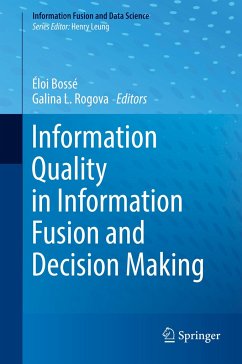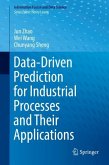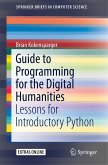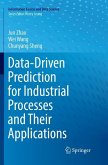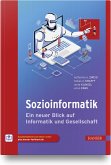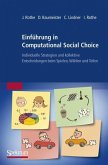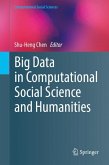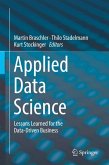Information Quality in Information Fusion and Decision Making
Herausgegeben:Bossé, Éloi; Rogova, Galina L.
Information Quality in Information Fusion and Decision Making
Herausgegeben:Bossé, Éloi; Rogova, Galina L.
- Gebundenes Buch
- Merkliste
- Auf die Merkliste
- Bewerten Bewerten
- Teilen
- Produkt teilen
- Produkterinnerung
- Produkterinnerung
This book presents a contemporary view of the role of information quality in information fusion and decision making, and provides a formal foundation and the implementation strategies required for dealing with insufficient information quality in building fusion systems for decision making. Information fusion is the process of gathering, processing, and combining large amounts of information from multiple and diverse sources, including physical sensors to human intelligence reports and social media. That data and information may be unreliable, of low fidelity, insufficient resolution,…mehr
Andere Kunden interessierten sich auch für
![Data-Driven Prediction for Industrial Processes and Their Applications Data-Driven Prediction for Industrial Processes and Their Applications]() Jun ZhaoData-Driven Prediction for Industrial Processes and Their Applications97,99 €
Jun ZhaoData-Driven Prediction for Industrial Processes and Their Applications97,99 €![Guide to Programming for the Digital Humanities Guide to Programming for the Digital Humanities]() Brian KokenspargerGuide to Programming for the Digital Humanities52,99 €
Brian KokenspargerGuide to Programming for the Digital Humanities52,99 €![Data-Driven Prediction for Industrial Processes and Their Applications Data-Driven Prediction for Industrial Processes and Their Applications]() Jun ZhaoData-Driven Prediction for Industrial Processes and Their Applications97,99 €
Jun ZhaoData-Driven Prediction for Industrial Processes and Their Applications97,99 €![Sozioinformatik Sozioinformatik]() Katharina A. ZweigSozioinformatik29,99 €
Katharina A. ZweigSozioinformatik29,99 €![Einführung in Computational Social Choice Einführung in Computational Social Choice]() Jörg RotheEinführung in Computational Social Choice32,99 €
Jörg RotheEinführung in Computational Social Choice32,99 €![Big Data in Computational Social Science and Humanities Big Data in Computational Social Science and Humanities]() Big Data in Computational Social Science and Humanities127,99 €
Big Data in Computational Social Science and Humanities127,99 €![Applied Data Science Applied Data Science]() Applied Data Science119,99 €
Applied Data Science119,99 €-
-
-
This book presents a contemporary view of the role of information quality in information fusion and decision making, and provides a formal foundation and the implementation strategies required for dealing with insufficient information quality in building fusion systems for decision making. Information fusion is the process of gathering, processing, and combining large amounts of information from multiple and diverse sources, including physical sensors to human intelligence reports and social media. That data and information may be unreliable, of low fidelity, insufficient resolution, contradictory, fake and/or redundant. Sources may provide unverified reports obtained from other sources resulting in correlations and biases. The success of the fusion processing depends on how well knowledge produced by the processing chain represents reality, which in turn depends on how adequate data are, how good and adequate are the models used, and how accurate, appropriate or applicable prior and contextual knowledge is.
By offering contributions by leading experts, this book provides an unparalleled understanding of the problem of information quality in information fusion and decision-making for researchers and professionals in the field.
By offering contributions by leading experts, this book provides an unparalleled understanding of the problem of information quality in information fusion and decision-making for researchers and professionals in the field.
Produktdetails
- Produktdetails
- Information Fusion and Data Science
- Verlag: Springer / Springer International Publishing / Springer, Berlin
- Artikelnr. des Verlages: 978-3-030-03642-3
- 1st edition 2019
- Seitenzahl: 636
- Erscheinungstermin: 10. April 2019
- Englisch
- Abmessung: 241mm x 160mm x 40mm
- Gewicht: 1108g
- ISBN-13: 9783030036423
- ISBN-10: 3030036421
- Artikelnr.: 54135802
- Herstellerkennzeichnung
- Springer Nature c/o IBS
- Benzstrasse 21
- 48619 Heek
- Tanja.Keller@springer.com
- Information Fusion and Data Science
- Verlag: Springer / Springer International Publishing / Springer, Berlin
- Artikelnr. des Verlages: 978-3-030-03642-3
- 1st edition 2019
- Seitenzahl: 636
- Erscheinungstermin: 10. April 2019
- Englisch
- Abmessung: 241mm x 160mm x 40mm
- Gewicht: 1108g
- ISBN-13: 9783030036423
- ISBN-10: 3030036421
- Artikelnr.: 54135802
- Herstellerkennzeichnung
- Springer Nature c/o IBS
- Benzstrasse 21
- 48619 Heek
- Tanja.Keller@springer.com
Éloi Bossé received the B.A.Sc., M.Sc., and Ph.D. degrees from Université Laval, Québec City, QC, Canada, in 1979, 1981, and 1990, respectively, all in electrical engineering. In 1981, he joined the Communications Research Centre, Ottawa, ON, Canada, doing research on signal processing and high-resolution spectral analysis. In 1988, he was transferred to the Defence Research Establishment, Ottawa, to research radar target tracking in multipath. In 1992, he moved to Defence Research and Development Canada Valcartier (DRDC Valcartier), Courcelette, QC, Canada, to lead a group of 4-5 Defence Scientists on information fusion and decision support. Since 1993, he has held Adjunct Professor positions with several universities, such as Université Laval (Québec, CA), the University of Calgary (Alberta, CA), Canada, and McMaster University, (Ontario, CA). He headed the Command & Control Decision Support Systems Section at DRDC Valcartier, from 1998 to his retirement in 2011. Dr. Bossé represented Canada (as a DRDC Member) in numerous international research fora under the various cooperation research programs (NATO, TTCP, and bi and bi- and trilaterals) in his area of expertise. Since 2011, he has been conducting some research activities under NATO Peace and Security Programme, as a Researcher with the Mathematics and Industrial Engineering Department, Polytechnic of Montreal, Montreal, QC, Canada, with the Department of Computer and Electrical Engineering Department at McMaster University and finally, as an Associate Researcher with IMT-Atlantique, Plouzané, France (since 2010). In 2015, he founded Expertise Parafuse Inc., in Québec city, a consultant ¿rm on Analytics and Information Fusion Technologies. He has published over 200 papers in journals, book chapters, conference proceedings, and technical reports. He has coauthored and coedited 4-5 books on information fusion. Galina Rogova received her MSc and PhD in Moscow, Russia. She is a research professor atthe State University of New York at Buffalo. She is recognized internationally as an expert in information fusion, machine learning, decision making under uncertainty, and information quality, and has lectured extensively on these topics. Dr. Rogova has worked on a wide range of defense and non-defense applications such as situation and threat assessment, understanding of volcanic eruption patterns, computer-aided diagnosis, and intelligent transportation system, among others. Her research was funded by multiple government agencies as well as commercial companies. She has published numerous papers and co-edited 7 books on information fusion and decision making.
PartI: Information Quality: Concepts, Models and Dimensions.- Chapter1: Information Quality in Fusion Driven Human-Machine Environments.- Chapter2: The Basic Principles of Uncertain Information Fusion: An organized review of merging rules in different representation frameworks.- Chapter3: Quality of Information Sources in Information Fusion.- Chapter4: Using Quality Measures in the Intelligent Fusion of Probabilistic Information.- Chapter5: Con ict management in information fusion with belief functions.- Chapter6: Requirements for total uncertainty measures in the theory of evidence.-Chapter7: Uncertainty Characterization and Fusion of Information from Unreliable Sources.- Chapter8: Assessing the usefulness of information in the context of coalition operations.- Chapter9: Fact, Conjecture, Hearsay and Lies: Issues of Uncertainty in Natural Language Communications.- Chapter10: Fake or Fact? Theoretical and Practical Aspects of Fake News.- Chapter11: Information quality and social networks.- Chapter12: Quality, Context, and Information Fusion.- Chpater13: Analyzing Uncertain Tabular Data. Chapter14: Evaluation of information in the context of decision-making.- Chapter15: Evaluating and Improving Data Fusion Accuracy.- PartII: Aspects of Information Quality in various domains of application.- Chapter16: Decision-Aid Methods based on Belief Function Theory with Application to Torrent Protection.- Chpater17: An Epistemological Model for a Data Analysis Process in Support of Verification and Validation.- Chpater18: Data and Information Quality in Remote Sensing.- Chapter19: Reliability-Aware and Robust Multi-Sensor Fusion Towards Ego-Lane Estimation Using Artificial Neural Networks.- Chapter20: Analytics and Quality in Medical Encoding Systems.- Chapter21: Information Quality: The Nexus of Actionable Intelligence.- Chapter22: Ranking Algorithms: Application for Patent Citation Network.- Chapter23: Con ict Measures and Importance Weighting for Information Fusion
PartI: Information Quality: Concepts, Models and Dimensions.- Chapter1: Information Quality in Fusion Driven Human-Machine Environments.- Chapter2: Quality of Information Sources in Information Fusion.- Chapter3: Using Quality Measures in the Intelligent Fusion of Probabilistic Information.- Chapter4: Con ict management in information fusion with belief functions.- Chapter5: Requirements for total uncertainty measures in the theory of evidence.-Chapter6: Uncertainty Characterization and Fusion of Information from Unreliable Sources.- Chapter7: Assessing the usefulness of information in the context of coalition operations.- Chapter8: Fact, Conjecture, Hearsay and Lies: Issues of Uncertainty in Natural Language Communications.- Chapter9: Fake or Fact? Theoretical and Practical Aspects of Fake News.- Chapter10: Information quality and social networks.- Chapter11: Quality, Context, and Information Fusion.- Chapter12: AnalyzingUncertain Tabular Data. Chapter13: Evaluation of information in the context of decision-making.- Chapter14: Evaluating and Improving Data Fusion Accuracy.- PartII: Aspects of Information Quality in various domains of application.- Chapter15: Decision-Aid Methods based on Belief Function Theory with Application to Torrent Protection.- Chapter16: An Epistemological Model for a Data Analysis Process in Support of Verification and Validation.- Chapter17: Data and Information Quality in Remote Sensing.- Chapter18: Reliability-Aware and Robust Multi-Sensor Fusion Towards Ego-Lane Estimation Using Artificial Neural Networks.- Chapter19: Analytics and Quality in Medical Encoding Systems.- Chapter20: Information Quality: The Nexus of Actionable Intelligence.- Chapter21: Ranking Algorithms: Application for Patent Citation Network.- Chapter22: Con ict Measures and Importance Weighting for Information Fusion applied to Industry 4.0.- Chapter23: Quantify: An Information Fusion Model based on Syntactic and Semantic Analysis and Quality Assessments to Enhance Situation Awareness.- Chapter24: Adaptive fusion
PartI: Information Quality: Concepts, Models and Dimensions.- Chapter1: Information Quality in Fusion Driven Human-Machine Environments.- Chapter2: The Basic Principles of Uncertain Information Fusion: An organized review of merging rules in different representation frameworks.- Chapter3: Quality of Information Sources in Information Fusion.- Chapter4: Using Quality Measures in the Intelligent Fusion of Probabilistic Information.- Chapter5: Con ict management in information fusion with belief functions.- Chapter6: Requirements for total uncertainty measures in the theory of evidence.-Chapter7: Uncertainty Characterization and Fusion of Information from Unreliable Sources.- Chapter8: Assessing the usefulness of information in the context of coalition operations.- Chapter9: Fact, Conjecture, Hearsay and Lies: Issues of Uncertainty in Natural Language Communications.- Chapter10: Fake or Fact? Theoretical and Practical Aspects of Fake News.- Chapter11: Information quality and social networks.- Chapter12: Quality, Context, and Information Fusion.- Chpater13: Analyzing Uncertain Tabular Data. Chapter14: Evaluation of information in the context of decision-making.- Chapter15: Evaluating and Improving Data Fusion Accuracy.- PartII: Aspects of Information Quality in various domains of application.- Chapter16: Decision-Aid Methods based on Belief Function Theory with Application to Torrent Protection.- Chpater17: An Epistemological Model for a Data Analysis Process in Support of Verification and Validation.- Chpater18: Data and Information Quality in Remote Sensing.- Chapter19: Reliability-Aware and Robust Multi-Sensor Fusion Towards Ego-Lane Estimation Using Artificial Neural Networks.- Chapter20: Analytics and Quality in Medical Encoding Systems.- Chapter21: Information Quality: The Nexus of Actionable Intelligence.- Chapter22: Ranking Algorithms: Application for Patent Citation Network.- Chapter23: Con ict Measures and Importance Weighting for Information Fusion
PartI: Information Quality: Concepts, Models and Dimensions.- Chapter1: Information Quality in Fusion Driven Human-Machine Environments.- Chapter2: Quality of Information Sources in Information Fusion.- Chapter3: Using Quality Measures in the Intelligent Fusion of Probabilistic Information.- Chapter4: Con ict management in information fusion with belief functions.- Chapter5: Requirements for total uncertainty measures in the theory of evidence.-Chapter6: Uncertainty Characterization and Fusion of Information from Unreliable Sources.- Chapter7: Assessing the usefulness of information in the context of coalition operations.- Chapter8: Fact, Conjecture, Hearsay and Lies: Issues of Uncertainty in Natural Language Communications.- Chapter9: Fake or Fact? Theoretical and Practical Aspects of Fake News.- Chapter10: Information quality and social networks.- Chapter11: Quality, Context, and Information Fusion.- Chapter12: AnalyzingUncertain Tabular Data. Chapter13: Evaluation of information in the context of decision-making.- Chapter14: Evaluating and Improving Data Fusion Accuracy.- PartII: Aspects of Information Quality in various domains of application.- Chapter15: Decision-Aid Methods based on Belief Function Theory with Application to Torrent Protection.- Chapter16: An Epistemological Model for a Data Analysis Process in Support of Verification and Validation.- Chapter17: Data and Information Quality in Remote Sensing.- Chapter18: Reliability-Aware and Robust Multi-Sensor Fusion Towards Ego-Lane Estimation Using Artificial Neural Networks.- Chapter19: Analytics and Quality in Medical Encoding Systems.- Chapter20: Information Quality: The Nexus of Actionable Intelligence.- Chapter21: Ranking Algorithms: Application for Patent Citation Network.- Chapter22: Con ict Measures and Importance Weighting for Information Fusion applied to Industry 4.0.- Chapter23: Quantify: An Information Fusion Model based on Syntactic and Semantic Analysis and Quality Assessments to Enhance Situation Awareness.- Chapter24: Adaptive fusion

